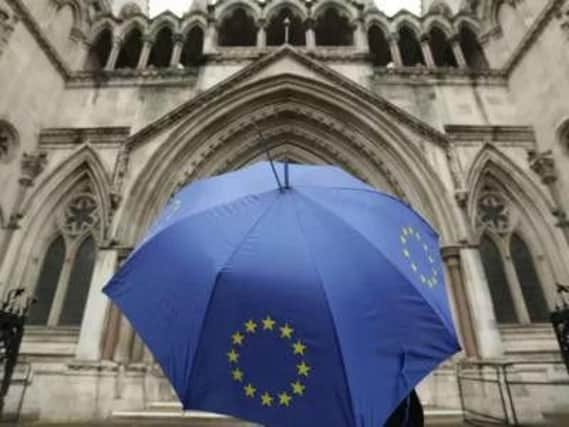Supreme Court: PM forcing through 'seismic constitutional change'


The claim by a top lawyer representing the Welsh Government came during the fourth and final day of the landmark legal case which will determine whether or not MPs will vote on Article 50.
It also came as members of the Labour Party hit back at the Conservatives for singling out MPs who refused to vote in support of the Government’s Brexit timetable.
Advertisement
Hide AdAdvertisement
Hide AdThey argued the decision to “name and shame” MPs was in direct contradiction to cross-party calls to the “vitriolic abuse” stirred up by the referendum.
As the Government’s Supreme Court appeal against last month’s Article 50 ruling entered its last day, the panel of judges heard from lawyers representing the devolved nations.
Speaking on behalf of the Welsh Government, Richard Gordon QC described June’s Brexit vote as “the most divisive political event that has happened over the last several decades”.
He went on to argue that Downing Street was seeking to use the prerogative power “to drive through the most major constitutional change in our system at least since 1972”.
Advertisement
Hide AdAdvertisement
Hide AdHe stated the Government’s treaty-making powers did not equate to a license to “dispense with laws, or subvert statutory schemes or crucify human rights”.
Arguing on behalf of the Scottish Government, Lord Advocate James Wolffe QC claimed the Scottish Parliament was also entitled to a say on exit process.
He said that triggering Article 50 was “a matter of significance and not simply a footnote” and it would be unlawful for Theresa May’s Government to proceed without a legislative consent motion from Holyrood.
He told the court: “The powers to change the laws of Scotland were given to Parliament, and of course those Parliament has authorised, and not to the Crown.
Advertisement
Hide AdAdvertisement
Hide Ad“That sets the bounds to the use of the prerogative and precludes the UK Government from asserting a power to make significant changes to laws of the land by virtue of the prerogative.”
Rounding off the proceedings on behalf of the UK Government, James Eadie QC insisted that the Prime Minister’s use of the royal prerogative to trigger Article 50 was entirely lawful.
He said it provides “a specific power to notify Article 50 and so start the process of withdrawal notwithstanding that will result in changes to domestic law”.
The court’s president, Lord Neuberger, stressed that the 11 presiding judges will do their best to resolve the case “as quickly as possible”.
Advertisement
Hide AdAdvertisement
Hide AdHe also made it clear that the ruling will not overturn the referendum result.
“The ultimate question in this case concerns the process by which that result can lawfully be brought into effect,” he said.
“As we have heard, that question raises important constitutional issues and we will now take time to ensure the many arguments presented to us... are given full and proper consideration.”
Yesterday also saw Labour face heavy criticism after most of its MPs voted in favour of Number 10s plans to trigger Brexit negotiations in March next year.
Advertisement
Hide AdAdvertisement
Hide AdThe party was accused of handing the Conservatives a “blank cheque” after 149 of its MPs – including leader Jeremy Corbyn –backed the Government’s plans in a symbolic opposition day vote.
Just a handful of Labour members opposed the motion, including shadow Transport Minister Daniel Zeichner, Penistone and Stockbridge MP Angela Smith and Huddersfield MP Barry Sheerman.
Explaining her decision during the Commons debate on Wednesday, Mrs Smith said she did not trust ministers to hold up their side of the deal and publish their Brexit plans.
Many of the rebels were later “named and shamed” by the Conservative Party press office, which posted a series of tweets claiming the MPs “won’t respect referendum result” and were “out of touch with ordinary working people”.
Advertisement
Hide AdAdvertisement
Hide AdThe move was criticised by MPs and Twitter-users alike who accused the party of conducting “a witch hunt”.
Mrs Smith told the Yorkshire Post: “The decision of Tory HQ to tweet the names of Labour MPs who voted against the Tory amendment yesterday was not only unpleasant but unwarranted.”
“This was not a decision about Brexit itself or even about whether or not to trigger Article 50, but rather a judgement about the adequacy of the Government’s plans for Parliamentary scrutiny of its approach.
“It also flew in the face of the repeated pleas from all sides of the House in yesterday’s debate for an end to the vitriolic abuse of those who dare to challenge the Government’s attitude to Brexit.”